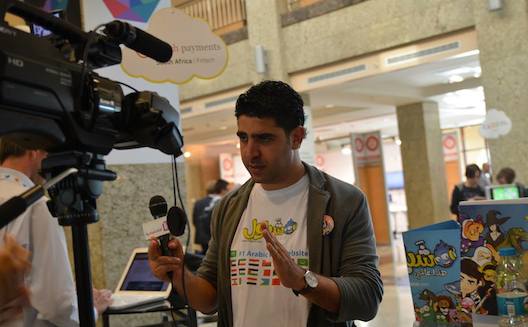Meet the Arab entrepreneurs who competed at Istanbul's WebIt Congress


On the two first days of October, in Istanbul, Turkey, the 6th edition of the Eurasian tech event Webit Congress took place. A large crowd, coming from both Europe and the Arab world, most of them already in town for another Eurasian tech event Startup Istanbul, met at the Haliç Congress Center, on the sunny shores of the Marmara Sea.
The event was marked by the participation of many well known speakers, including about.me founder Tony Conrad, Rahul Sood from Microsoft Ventures, and Justin Kan, the founder of Twitch and Justin TV, and a partner in Y Combinator. The talks were divided into two themes: Leaders of the Future, featuring mostly motivational speeches, and Digital Marketing and Innovation, that dug into new marketing trends in the tech industry.
We met with startups selected to present their products at booths vying to win the Founders Games. Turkey, Ukraine, Bulgaria, Croatia, the UK, France, and other European countries were well represented, but Arab startups didn’t go unnoticed: there were 12 startups representing the Middle East.
Ta3rifah (Egypt/UAE): This SaaS mobile app allows small and medium shops to adapt their offers by analyzing clients’ preferences and consumption habits, while clients can be notified of the offers and discounts relevant to their needs and preferences, and collect loyalty points. The app also offers companies an analysis of their product offer, and of how they might improve their acquisition strategy.
Ta3rifah bills each company monthly depending on how many stores use the service. The startup currently has eight clients in the UAE, mostly restaurants.
The startup, which employs six people and has raised $300,000 USD, came to WebIt to work on their second ongoing $500,000 USD fundraising round. The startup was among the Founders Game finalists, but didn’t win. “We’re not disappointed,” says Ismail Issa, one of the three cofounders. “This is probably the 8th or 9th competition we’ve taken part in, and there will be more.”
Medica Reminders (Egypt): This mobile application enables users to save their medical prescriptions (dosage, frequency, etc.), and to program alerts to ensure they won’t forget to take their drugs, and won’t miss their medical appointments. The startup came to WebIt to raise additional funds and promote the app.
Shablol (Jordan): This Arabic education website offers 7 to 13-year-old kids articles, games, and interactive activities, in both private and moderated forums, from 10 AM to 10 PM (the opening hours of the website). With over 2 million visitors, and 1.3 millions registered users (75% of whom are active) according to founder Jozef El Atrach (pictured above), Shablol is among the most visited websites in Jordan and Egypt.
The startup, which has already raised a total $3 million USD investment, and employs 22 people, was here to convince investors. Shablol left the event with the Founders Games first prize.
Sawerly (Saudi): This platform puts photographers and clients in contact with each other. Clients can check the profile and portfolio of the photographers, as well as previous clients’ feedback, and get a quote or book online. Launched three months ago (although the company graduated as part of Flat6Labs’ first class back in February), the website has already helped 30 people book a photographer. The startup plans on developing other services, including a photo equipment e-store, customized pictures, and more.
Tamatem (Jordan): The video game editor and platform, well familiar to Wamda’s readers, came to meet potential partners, and find new games to publish.
Sufraty (Palestine/Saudi): This app lets users find and share recipes within a community of users. Sufraty has 1,000 users, and although its founders are Paletsinian, it based in Saudi Arabia. Companies can do native advertising, including sponsoring the professional chefs' own channels, and buy product placement within recipes.
Sufraty recently closed its first fundraising round to develop its marketing.
Kezakoo (Morocco): This collaborative e-learning platform offers video for students from the age of 6 to 23, in both French and Moroccan Arabic. According to cofounder Youssef Ghalem, the site has 25,000 active users, 25% of whom come from Algeria, and feature over 750 videos. Until now, Kezakoo makes money from selling its content to companies and schools; the startup should start monetizing its P2P platform starting next year.
Taking part in Webit allowed the startup to gather user feedback, and to benefit from entrepreneur and investor tips, as well as boost the team’s motivation.
IT flakes (UAE): This software helps dentistry clinics optimize their management. After the UAE, the startup plans on expanding to the US and Canada.
Arab entrepreneurs generally left the event satisfied with the networking they did, especially with investors. The presence of these promising Arab entrepreneurs at this event is even more evidence of MENA entrepreneurs’ desire to expand globally, and of the need to facilitate opportunities to connect them with the global ecosystem.
Photo credit: Abdelbar Aglagane



